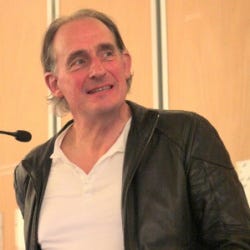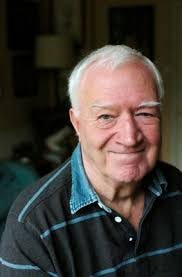A recently-released collection of writings by Andy Croft, one of the UK’s most active and political of wordsmiths as poet, commentator and publisher, draws attention to a reader who memorably presented his work at the Albert Hall live extravaganza in June 1965, exactly 60 years ago this month.
Adrian Mitchell, who famously shared the piece ‘Tell Me Lies About Vietnam', was regarded as a genuine success at the International Poetry Incarnation, capturing the mood of the moment and the rapt focus of vast 7,000 strong crowd, later appearing in Wholly Communion, Peter Whitehead’s film of the groundbreaking occasion
Mitchell, a great friend of Michael Horovitz, was an English writer dedicated to the Blakeian tradition but someone who never felt the need to consciously separate himself from the American Beats – Horovitz and Pete Brown were the same – as many British poets did.
Pictured above: Radical poet and publisher Andy Croft
When Mitchell died in 2008, Andy Croft penned an obituary to the man. Croft, who has spent a life writing poetry and sharing the creative output of others through his long-running Smokestack Books imprint, has now produced a compilation of essays, reviews and other previously-published work in The Privatisation of Poetry, a title issued by Broken Sleep Books at the end of last year.
We re-produce Croft’s lively and eloquent tribute to Mitchell as part of Rock and the Beat Generation’s commemoration of the Albert Hall anniversary, a memorial also, in its way, to Smokestack Books which Croft oversaw for 20 years and almost 240 books – one a month for two decades – but decided to close its doors in 2024.
____________________________________________________________________________
Adrian Mitchell 1932-2008
‘…Orpheus and Dionysus, Lennon and McCartney, Ginsberg and Guthrie’
By Andy Croft
SOMETIME IN 1968, Adrian Mitchell addressed a Youth CND demonstration against the US war on Vietnam. Among the crowd was the usual Special Branch plod, who solemnly wrote in his report that ‘Adrian Mitchell recited one of his poems, the meaning of which was largely unintelligible…’
Mitchell believed that British secret services had been interested in him ever since, as a student he attended a Communist Party wine and cheese event ‘for peace’. ‘I wasn't a Communist,’ he said, ‘but I like wine. And cheese. And peace. I hope they still have their notebooks open, because I'm still doing this stuff.’
When the Home Office were asked, under the Freedom of Information Act, to release their files on Mitchell, they said that they could ‘neither confirm nor deny’ their existence, since to do so might threaten ‘national security’.
It’s a ludicrous though instructive story, which says much about British political culture. On one hand there is something called the ‘national’ interest, defined by people for whom poetry is ‘largely unintelligible’. On the other hand – food, wine, peace and poetry. But it is good to know that at least someone considers Adrian Mitchell’s life and work as being of national importance.
Pictured above: Blakeian Beat Adrian Mitchell
Adrian Mitchell was far too radical a writer to become a ‘national treasure’. But he was undoubtedly a national figure, a widely respected poet, novelist, playwright, librettist and children’s writer, and a uniquely popular performer who took his poetry to schools and festivals and readings all over the world for more than fifty years.
He was the only British poet invited to the inauguration of Thabo Mbeki as South African President 1999. In 2005 his poem ‘Human Beings’ was voted the poem that people would most like to send into space as a message from Earth. His famous lines, ‘Most people ignore most poetry because most poetry ignores most people’ have recently been reproduced on a T-shirt from Philosophy Football.
Adrian Mitchell enjoyed the most glittering of writing careers. And yet it was curiously free of the usual glittering prizes. He received an Eric Gregory Award in 1961, a PEN Translation Prize in 1966 for Marat/Sade and a PBS Best Children’s Collection in 2004 for Daft as a Doughnut. And that’s it. It’s a poor reflection on British life. But perhaps honouring our greatest poet while he was alive would have threatened ‘national security’.
Of course, Mitchell would have been the first to dismiss the shabby world of literary prize-giving. After all, he liked to describe himself as ‘a socialist-anarchist-pacifist-Blakeist-revolutionary’. As the broadsheets and the bookies contemplate the choice of the next poet laureate, it is worth remembering Adrian Mitchell’s description of the work of the laureate, ‘as this: / A long, thin streak of yellow piss.’ He once said he would only consider the job only if he was allowed to ‘tap-dance on the coffin at every Royal Funeral’. Asked once by the Telegraph to write a poem about Prince Charles he responded with, ‘Royalty is a neurosis. Get well soon.’
British literary life usually knows how to separate radical writers from their politics, which are conventionally ‘explained’ or subsumed by other identities – Sylvia Townsend-Warner was gay, Day Lewis was never really comfortable with politics, John Cornford was looking for martyrdom, Edgell Rickword was silenced by orthodoxy, Patrick Hamilton was a drunk etc.
But it is clearly impossible to separate Adrian Mitchell’s personality from his work or from his politics. He really was as kind and generous and radical in his life as he was in his poetry. A great poet as well as a great bloke. You can’t have one without the other.
Because Adrian Mitchell was so good on stage, it is perhaps easy to forget how good a poet he was on the page. As though his poetry lived in the shadow of its author. And of course he was the most wonderful of readers, whose distinctive manner of performing his work was like a kind of syncopated dance, part prayer, part giggle. Orpheus and Dionysus, Lennon and McCartney, Ginsberg and Guthrie.
He was the wisest and most eloquent of the Children of Albion, William Brown meets William Blake, mischievous and ‘innocent’ like the boy who is not afraid to ask why the Emperor is not wearing any clothes. He combined the jazz-poetry of the North American Beats, the radical folk tradition of Latin American communists like Victor Jara, and the Springtime optimism of Soviet troubadours like Yevtushenko and Voznesensky (Kenneth Tynan once called him ‘the British Mayakovsky’).
He was the inheritor of a peculiarly English tradition of nonsense, nursery and cautionary tales, from Carroll and Lear, Belloc and Chesterton, to Ivor Cutler and Spike Milligan. He wrote with the unflinching seriousness of Brecht (see, for example, his stunning version of ‘Von der Kindesmörderin Marie Farrar’). And he was the nearest equivalent in British literary life to the French writer Jacques Prévert, writing playful, punning and apparently childish little fables that packed an extraordinary punch – irreverent, anti-intellectual, unpicking the logic of authority and war.
Adrian Mitchell was a truly great poet. We must not forget this. His Bloodaxe collections, Heart on the Left: Poems 1953-85, Blue Coffee: Poems l986-l995, All Shook Up: Poems 1996-2000 and The Shadow Knows: Poems 2000-2004 are an extraordinary and incomparable achievement. He wrote many great and justly famous individual poems, but now they are collected under one roof they may be seen to constitute a single, huge, sprawling epic for our times, comical and visionary, heartening and heart-breaking.
Editor’s note: Originally published in The North, No 43, Summer 2009. Re-published here with permission of the author
See also: ‘Correspondence #56: Miles’, June 18th, 2025; ‘Correspondence #55: Vanessa Vie’, June 17th, 2025; ‘Interview #38: Miles’, June 11th, 2025






Tigress tigress burning bright in the fyre of the night @ Albert Hall among prophets and superstars as poetic voices ranged and chimed with the nonconformity of the revolution which would spawn countless Recusants. I’m with MI6 you know. Don’t tell anyone. Keep it to yourself
You an keep a secret Righto
Hi Simon .I only met Adrian once,and despite what I'd heard he was easy to get along with.
Really enjoyed your article.
Simon can you check your email and spam.
All the Best
Malcolm.